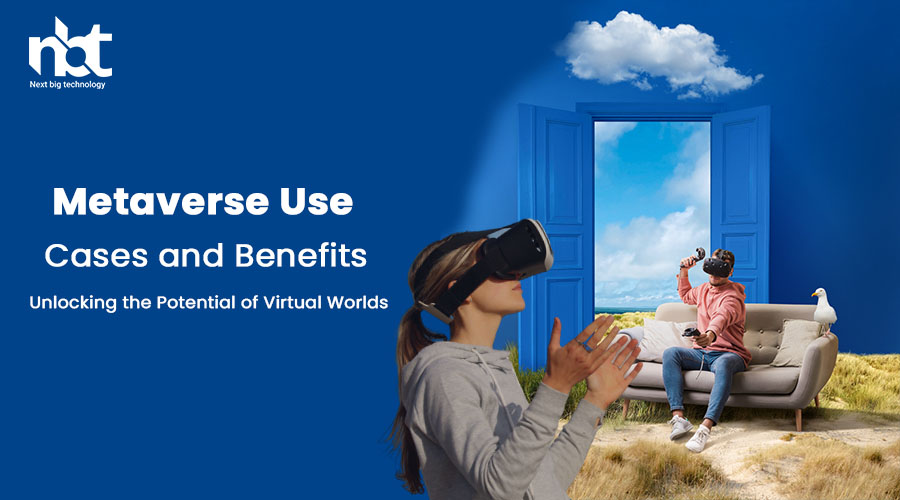Introduction: The concept of the metaverse has captured the imagination of technologists, entrepreneurs, and visionaries, signaling a new era of immersive and interconnected digital experiences. The metaverse refers to a virtual universe that combines elements of virtual reality, augmented reality, social networking, and gaming. In this blog, we will explore the various use cases and benefits of the metaverse, delving into its transformative potential across industries and redefining how we live, work, and interact.
- Virtual Social Spaces: The metaverse offers an opportunity to create virtual social spaces where individuals can connect, interact, and socialize in a digital environment. These virtual communities can bridge physical distances, allowing people from around the world to come together, collaborate, and form meaningful relationships. Virtual social spaces can range from shared virtual offices and coworking environments to immersive social hubs for events, conferences, and entertainment.
- Education and Training: The metaverse has immense potential in the field of education and training. Virtual classrooms and training simulations can provide interactive and immersive learning experiences, allowing students to explore virtual environments, conduct experiments, and engage in collaborative problem-solving. The metaverse can also enable lifelong learning by providing access to a vast repository of knowledge, courses, and educational resources.
- Virtual Commerce: The metaverse presents exciting possibilities for virtual commerce, transforming the way we shop, sell, and engage with products and services. Virtual marketplaces and storefronts can offer immersive shopping experiences, allowing users to browse and purchase virtual and physical goods. Brands can leverage the metaverse to showcase their products in unique and engaging ways, while consumers can personalize and customize their virtual shopping experiences.
- Entertainment and Gaming: Entertainment and gaming are natural domains for the metaverse, as virtual worlds can provide immersive and interactive experiences for players and fans. From multiplayer online games to virtual reality experiences, the metaverse offers a platform for storytelling, exploration, and social interaction. Virtual concerts, live events, and virtual reality gaming can create new avenues for entertainment and engagement, blurring the boundaries between the physical and digital realms.
- Architecture and Design: The metaverse can revolutionize the architecture and design industries, allowing professionals to create and visualize virtual spaces before they are built in the physical world. Architects, interior designers, and urban planners can use virtual environments to simulate designs, test different configurations, and gather feedback from clients and stakeholders. This enables more efficient and cost-effective design processes, minimizing the need for physical prototypes and facilitating collaborative design workflows.
- Healthcare and Therapy: In the field of healthcare, the metaverse can provide innovative solutions for patient care, therapy, and medical training. Virtual reality environments can simulate medical procedures, enabling healthcare professionals to practice complex surgeries or train for emergency situations. Virtual therapy sessions can offer mental health support in a safe and controlled environment. The metaverse can also facilitate remote consultations, connecting patients with doctors regardless of geographical limitations.
- Remote Work and Collaboration: The metaverse has the potential to transform the way we work and collaborate, especially in a world increasingly embracing remote work. Virtual offices and meeting spaces can enable geographically dispersed teams to collaborate, hold virtual meetings, and work together in a shared digital environment. This fosters productivity, enhances communication, and reduces the need for physical office spaces, saving costs and reducing environmental impact.
- Cultural Preservation and Exploration: The metaverse can contribute to the preservation and exploration of culture and heritage. Virtual replicas of historical sites, museums, and artifacts can be created, allowing individuals to explore and learn about cultural treasures from anywhere in the world. This can foster cultural exchange, promote tourism, and ensure the preservation of cultural heritage for future generations.
- Personalized Avatars and Digital Identities: The metaverse allows individuals to create and personalize digital avatars that represent them in virtual spaces. These avatars can transcend physical limitations, providing individuals with new ways to express themselves and interact with others. Digital identities within the metaverse can enable individuals to explore alternative personas, experiment with new skills and identities, and foster a sense of belonging in virtual communities.
- Research and Simulations: The metaverse can serve as a powerful tool for research, simulations, and scientific discovery. Scientists can use virtual environments to simulate complex phenomena, conduct experiments, and visualize data. This can accelerate research and innovation in fields such as physics, chemistry, biology, and astronomy. Simulations within the metaverse can also aid in disaster preparedness, urban planning, and environmental sustainability.
Conclusion: The metaverse represents a paradigm shift in how we perceive and engage with the digital world. With its immersive experiences, virtual social interactions, and transformative potential across industries, the metaverse is set to redefine our understanding of reality and offer limitless opportunities for innovation and creativity. From education and entertainment to healthcare and remote work, the metaverse has the power to shape the future of human experiences, enabling us to connect, learn, collaborate, and explore in ways that were once unimaginable. As the metaverse continues to evolve, it will be crucial to address ethical considerations, privacy concerns, and ensure inclusivity and accessibility for all, creating a metaverse that enriches and empowers individuals and communities worldwide.

















